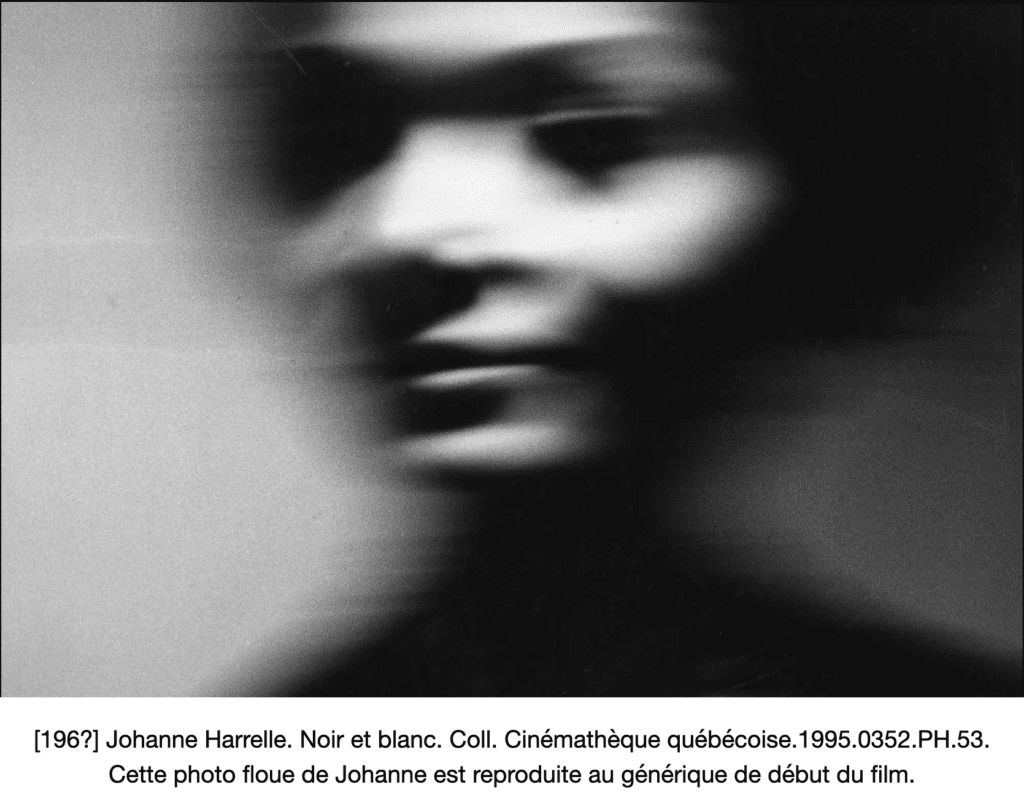An initial post-symposium note:
This Orphan Film Symposium on Counter-Archives was rewarding; one first-time attendee said “transformative.” Others offered similar assessments, in more joyful words than I write here. With 80 presenters and a sizable group of organizers and star projectionists many mercis are due.
A hallmark of Orphan Film Symposiums is the accidental “rhyme,” a serendipity connecting two or more moments in two or more of the works screened. One of this year’s rhymes is minor, a literal wordplay: Jojolo and Jo-jaw-gay. Another is significant: that an opening night film featured a Montréal protagonist who we saw again on closing night, in a work we had not planned to show.
With the deliberate “decolonize this place” purpose of the Archive/Counter-Archive (A/CA) project, the symposium referred to Montréal by its pre-colonial name, Tiohtià:ke. An approximate pronunciation is Jo-jaw-gay.
We also learned about a woman who called herself Jojolo, in a New Wave-ish 1966 film of the same name. We first saw her face in Origines (2020) by Montreal-born artist Nadine Valcin. She describes the work as a “two-channel media installation that uses footage from Claude Jutra’s 1963 film À Tout Prendre to explore his then lover and film co-star Johanne Harrelle’s complicated quest for identity as a Black Francophone woman in Canada.”
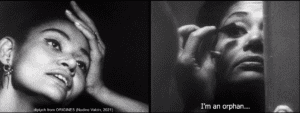 The production was part of her residency at Library and Archives Canada, organized by A/CA.
The production was part of her residency at Library and Archives Canada, organized by A/CA.
Prior to the symposium, an image of Harrelle became part of the Orphans 2022 social media (graphics by Valeria Kriletich)
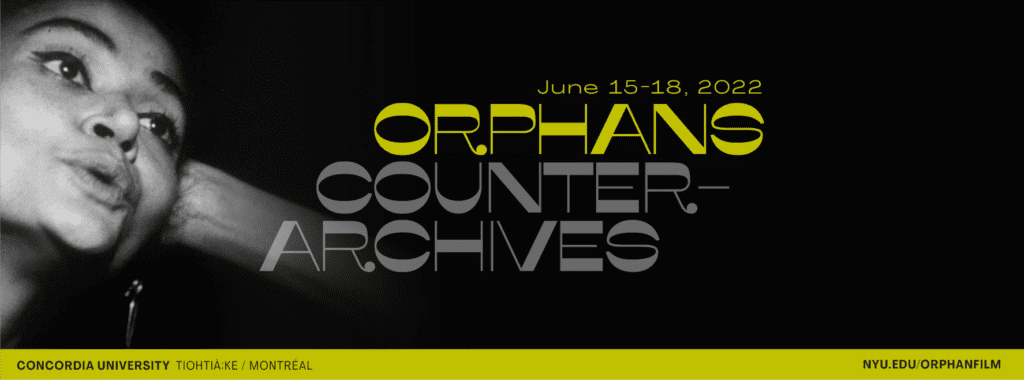 and subsequently a video trailer (by Long Xi Vlessing) played before OFS sessions. Kriletich selected the image from among the many submitted by participants.
and subsequently a video trailer (by Long Xi Vlessing) played before OFS sessions. Kriletich selected the image from among the many submitted by participants.
At the opening-night screening of Origines, Valcin discussed her goal to make a documentary about the life of Montréal-born Johanne Harrelle. By coincidence, that same day CK Ming and Bleakley McDowell of the U.S. National Museum of African American History and Culture suggested adding Jojolo to their presentation about its co-director, Lebert “Sandy” Bethune.
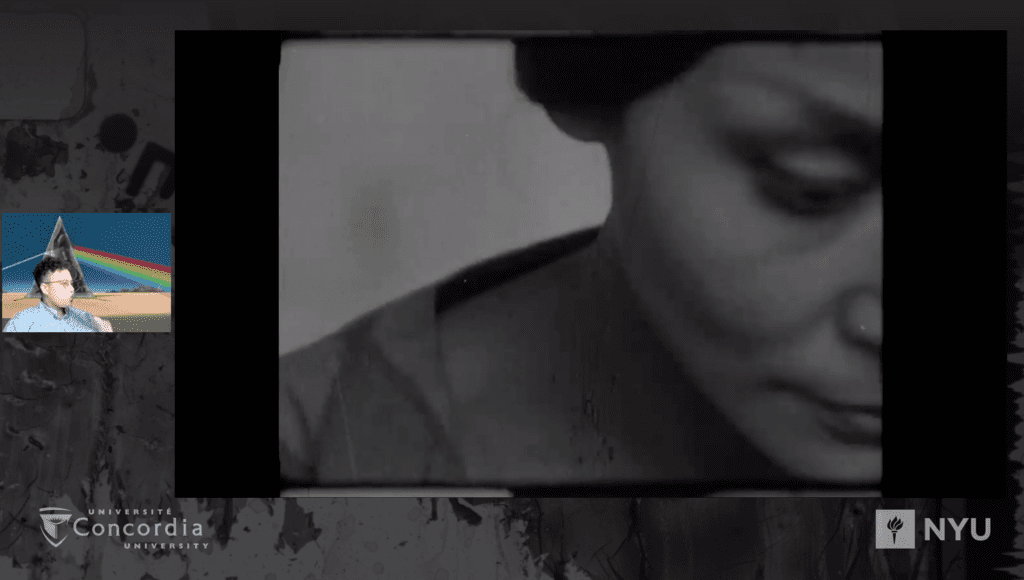
The 1966 short film by Bethune and John Taylor, is a portrait of Harrelle, shot in Paris, where she was working as a model. Their presentation focused on 1971 footage from his never-completed film Pan Africa. But the serendipity of NMAAHC having recently acquired a print from Bethune made the seldom-seen Jojolo too good to pass up. We added an unannounced screening of it on the closing night.
So little-known is the film that seemingly no one at the symposium had heard of it, including Johanne/Jojolo’s would-be biographer. Now Valcin has a substantial piece of evidence upon which to expand her work in progress. [Update: July 2024. Nadine Valcin has completed the documentary portrait, entitled Simply Johanne.]
Johanne de Montréal est Jojolo de Tiohtià:ke.
Addendum
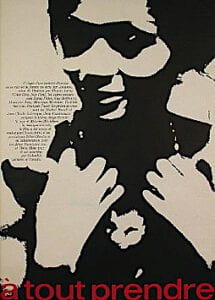 Unlike Jojolo, Claude Jutra’s À Tout Prendre (Take It All a.k.a. All Things Considered, 1963) is a landmark work, preserved in multiple editions, not an orphan at all. It received international commercial distribution. At present the Cinémathèque Québécoise freely streams no less than three versions of the film: the original 16mm version in French and a later 35mm edition, plus an English version translated by one Leonard Cohen [!] with voice-over narration by Jutra and Harrelle. The Cinémathèque also hosts extensive documentation about the film in its on-line dossier “À tout prendre de Claude Jutra : 50 ans.”
Unlike Jojolo, Claude Jutra’s À Tout Prendre (Take It All a.k.a. All Things Considered, 1963) is a landmark work, preserved in multiple editions, not an orphan at all. It received international commercial distribution. At present the Cinémathèque Québécoise freely streams no less than three versions of the film: the original 16mm version in French and a later 35mm edition, plus an English version translated by one Leonard Cohen [!] with voice-over narration by Jutra and Harrelle. The Cinémathèque also hosts extensive documentation about the film in its on-line dossier “À tout prendre de Claude Jutra : 50 ans.”
Yet in another sense this praised and problematic work shares a kind of orphanhood with suppressed or censored films. Thomas Waugh (who attended Orphan 2022) reminds us that in 1964 Quebec’s Office Catholique National des Techniques de Diffusion evaluated it as “A proscrire,” to be banned. See the two Waugh essays in a special section (The Claude Jutra Affair) of Jump Cut (Spring 2018): “Introduction to À tout prendre.” and “’Do you like boys?’ Claude Jutra’s Disappearances: Confession, Courage, Cowardice.” Further, the film discussed homosexuality at a time when it was a criminal act under laws of Quebec and Canada. And its characters’ inter-racial romance was itself a taboo. Finally, even if À tout prendre isn’t literally censored today, after 2016 allegations of Jutra’s pedophilia and sexual assault, authorities deleted Claude Jutra from place names, film awards, and a Cinémathèque Québécoise screening room.
Also in that Jump Cut section, is a studied consideration of Johanne Harrelle: “Black Bodies, Queer Desires: Québécois National Anxieties of Race and Sexuality in Claude Jutra’s À tout prendre (1963)” by Gregorio Pablo Rodríguez-Arbolay Jr.; previously published in a Cinémathèque Québécoise dossier, edited by Pierre Jutras, “À tout prendre de Claude Jutra: 50 ans (Apr. 2014).
Its bibliography includes these primary sources about “Jojo” (as Harrelle signed her name).
• Johanne Harrelle, “Lettre de Johanne Harrelle à Claude Jutra,” Fonds d’archives Claude-Jutra, Archives UQAM, Université du Québec à Montréal, (Sep. 1963), 46P-030/280 (11).
• [Joseph] Rudel-Tessier, “Johanne n’était pas haïtienne mais elle avait ses raisons” [Johanne was not Haitian but she had her reasons], Photo-Journal (May 1964): monsieurjeff.ca/johanne-harrelle.
Curiously, and despite her celebrity, Harrelle is credited on-screen in À Tout Prendre only as “Johanne,” which is also the name of her semi-fictional character. In Jojolo, her full name appears in the opening credits.
